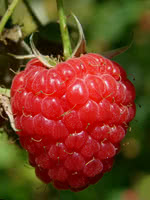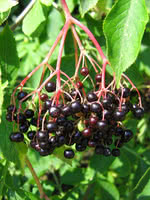Mon-Fri 9am - 5pm Mountain time
Souris Raspberry (an improved Boyne Raspberry) vs Black Elderberry
Rubus x Souris
Sambucus canadensis
NOT AVAILABLE THIS SEASON - MIGHT RETURN
NOT AVAILABLE THIS SEASON - MIGHT RETURN
Souris is an improved version of Boyne, the classic prairie raspberry. It is planted all across Canada and is extremely robust. Where other raspberry cultivars rely on unique selling points and specializations, Souris is just generally a great raspberry.
Souris is cold hardy and resistant to disease and spider mites. Its berries are deliciously sweet and tart while colourful, great for U-pick operations, fresh eating, or using in products such as jams and pies. They can be a bit softer than other raspberry varieties.
The Souris Raspberry is a fast-growing floricane. This means that raspberries will not grow on canes the year they first grow. The mature canes they do grow on, however, produce more berries than primocane varieties.
Black Elderberry is a deciduous shrub native to eastern North America. You can plant this shrub in moist areas and it will help stabilize your soil. You can also use it on rural properties anywhere you'd use a lilac.
Black Elderberries are considered to be partially self-pollinating. So while they will still produce some berries without cross-pollination, planting with another variety will increase yields. Consider planting with Ranch Elderberry or Bob Gordon Elderberry.
Warning: the seeds, stems, leaves, roots, and uncooked berries of the Black Elderberry are poisonous to humans when eaten in quantity. You should cook the berries to make them safe for human consumption.
Souris Raspberry (an improved Boyne Raspberry) Quick Facts
Black Elderberry Quick Facts
Toxicity: leaves, stems, and uncooked berries are poisonous to humans

